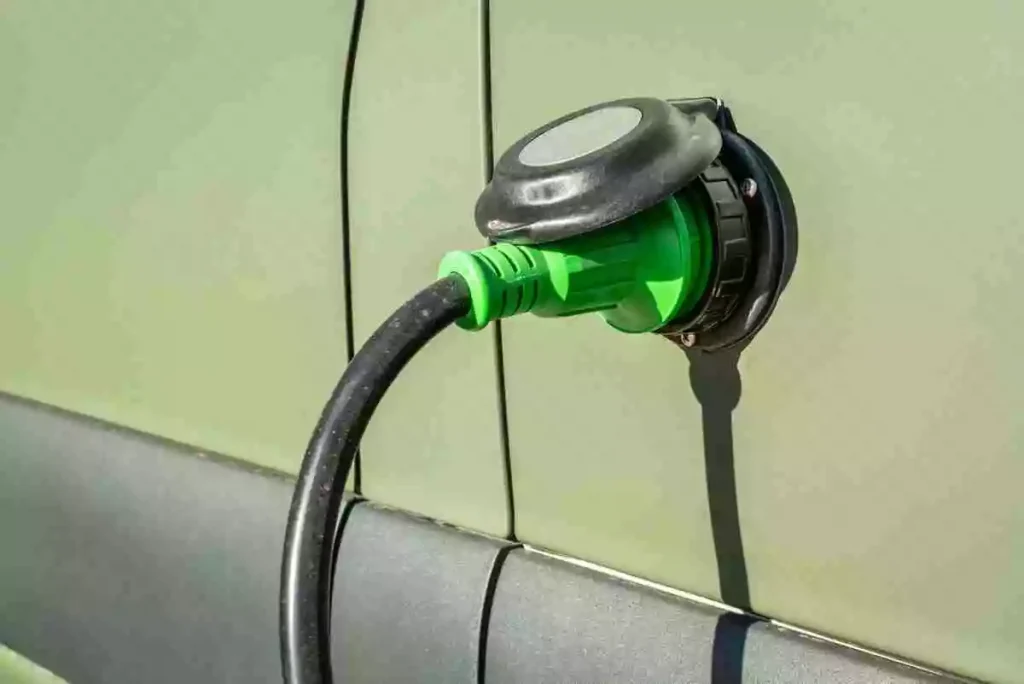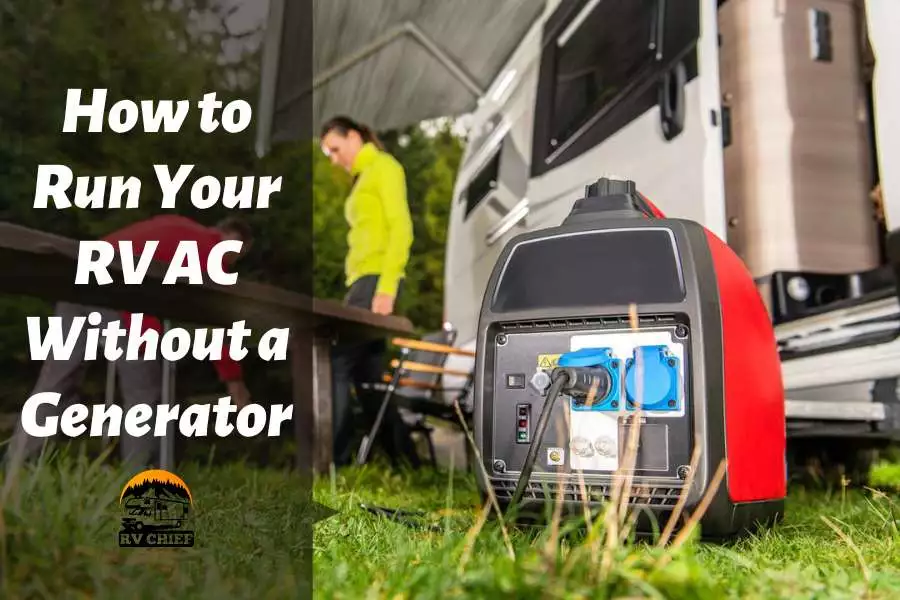The best news right now is that you can travel the world on your recreational ride without thinking of how to power your AC with a fuel-drinking and noisy generator. ACs are vital parts of motorhomes as it helps keep the vehicle cool. You’ll enjoy maximum comfort with your air conditioner running throughout your trip.
There are other methods to keep your RV AC running without a generator. Deep-cycle batteries are the most popular alternative. Also, you install inverters (solar power) to keep your RV batteries charged. Connecting your AC directly to a power source is another excellent option. All these alternative options can conveniently power other appliances in the vehicle without creating problems.
In this piece, you’ll discover alternative options for running RV AC without a generator. You’ll also learn the pros and cons of these options, so you can make an informed decision before embarking on your next adventure.
Table of Contents
How to Prep Your RV AC to Run Without a Generator
The first thing to do before running your RV air conditioner without a generator is to prepare the system. Below are the steps to follow:

1. Examine the RV’s Electrical System
Confirming whether your RV’s electrical system is in good condition is crucial. You can verify this by checking the alternator, conductor, and battery. This examination ensures the RV has the power to run the air conditioner without a generator.
2. Get a First-grade Power Inverter
This setup requires a high-quality inverter with a big capacity. The power inverter converts the direct current in the RV’s battery to the alternating current that’ll run the AC.
3. Assemble the Basic Tools
Before installing your RV power inverter, assemble all the necessary tools (wire connectors, pliers, screwdrivers, etc.). With these tools, the installation process will be seamless, and in no time, your RV’s AC will be powered.
Guide on How to Run Your RV AC Without a Generator – Alternative Power Sources
Running an RV air conditioner without a generator can be challenging since air conditioners typically require significant electrical power. However, there are a few alternative power sources you can try:
1. Extra Batteries
Recreational vehicles come standard with built-in batteries. These batteries are the primary power source in RVs and can run the AC for some time.
Unfortunately, the RV’s AC requires constant electricity to function correctly. So, it’s only a matter of time before the AC kills the batteries, as it requires a large amount of current to power the compressor.
However, there are batteries with higher capacities that can sustain your ACs. For instance, installing nine 100 Ah batteries can keep your AC running for up to 4 hours. But they’re pretty costly.
In addition, lithium (deep-cycle) batteries are more efficient than lead-acid batteries. Besides, they can be recharged and discharged repeatedly without any damage.
Also, if you’re using batteries to power your AC, install a battery bank in your RV. A battery bank contains several batteries connected in parallel, increasing their capacity.
The higher the batteries in your battery bank, the longer your AC’s running time. With your battery bank, rest assured of an exciting adventure without generator problems.
2. Solar Panels

To power the RV, solar panels receive energy from sunlight and convert same to electrical energy for use. You’ll have to install an inverter to use solar power effectively.
The solar panels produce DC power which the inverter converts into AC power to power your appliances (including the AC). So, using an inverter with a large enough capacity to carry the AC’s load is essential.
One downside of solar panels is that it requires ample space on the motorhome top. If the space isn’t enough, the AC won’t function properly.
Also, solar panels won’t generate electricity at night as there’ll be no sun. You’ll need to install solar panels with high wattage (about 2000 watts) to generate enough power for your RV.
Additionally, if you want your AC to last longer, don’t turn on other appliances when your AC is running. Else, those appliances will draw all the energy from solar panels or batteries.

Unfortunately, solar panels don’t have enough capacity to keep your AC running long. So, it’s advisable to pair them with your lithium batteries.
As the solar panels use sunlight to charge the batteries, energy is preserved, and you’ll have an uninterrupted power supply even at night.
The good news about solar panels is that they barely require maintenance and can be easily found anywhere in the world. Cleaning them often is enough to keep them in perfect condition.
In addition, they’re environmentally and budget-friendly, as they’re renewable energy sources.
3. Direct Power Source
Before connecting your RV to a direct power source, ensure the rating of the electrical pedestal matches the amperage and voltage of your RV’s AC.
Besides your AC, the direct power source can power other RV appliances like TV, refrigerator, etc. To avoid any hassles, ensure your campground has a constant power supply if you’re using this method.
If you do, you’ll be stranded. You’ll need different tools to connect your RV to a direct power source. Some include:
Inverter
It’ll help convert the current from a direct power source. Once the current is converted, the power generated can run your AC and even charge the RV batteries.
Electrical Hookups
With the help of electrical hookups, you can run your AC and even charge your batteries faster without needing a generator.
Shore Power Cord

This cord is an electrical cable that connects your RV to the electrical pedestal at your campground. It has to be long enough to secure the connection.
4. Portable Power Stations
These devices are lightweight and easy to transport. They’re one of the best alternative power sources for RVers. You can charge them with car chargers or wall outlets.
Once they’re charged, they provide enough power to keep your easy and other appliances running.
5. Propane
Propane-powered ACs can function effectively without a generator. They have fuel tanks which, when refilled, provide the necessary power.
They’re one of the best options for RV owners without a generator.
Pros of Running RV AC Without Generator
Below are some of the advantages of running your AC without a generator:
#1. Quieter Operation
Generators can be noisy, disturbing the tranquility of your camping experience and potentially annoying neighboring campers.
You can enjoy a quieter environment when running the RV AC without a generator, especially when using battery or solar alternatives.
#2. Saves Cost
Operating a generator can be expensive due to fuel costs and maintenance. You can avoid these additional expenses by running the RV AC without a generator and save money in the long run.
#3. Increased Mobility
Generators can limit your mobility due to their weight and space requirements. Without a generator, you can explore and camp in remote locations without worrying about carrying and setting up a generator.
Cons of Running RV AC Without Generator
Let’s explore the downsides of operating an RV AC without a generator.
#1. Limited Runtime
Alternative power sources like batteries or inverters have limited capacity, which may result in shorter runtime for running the AC. You should manage your power usage carefully and restrict the air conditioner’s operation to conserve power.
#2. Weather Dependence
Extreme weather conditions can affect the effectiveness of running an RV AC without a generator. In high temperatures, alternative power sources may struggle to meet cooling demands.
Similarly, in cold climates, additional power may be required for heating systems, impacting the available power for the air conditioner.
#3. Battery Maintenance
Depending on the alternative power source, such as batteries, you must ensure proper maintenance and charging.
Regular monitoring and recharging of batteries are necessary, which adds to your responsibilities and may require extra equipment.
Frequently Asked Questions About Running Your RV AC Without a Generator
What’s the Duration For Running My RV AC on Battery?
The duration your AC runs on a battery depends on the size of your air conditioner and the capacity of your battery. If you use an undersized battery to power a large AC, the AC will go off in minutes.
To avoid such occurrences, consult an expert to assess your AC and recommend suitable batteries and inverters.
Which Battery is Best For My RV AC?
Deep-cycle batteries are always the go-to. They can be charged and discharged repeatedly without losing capacity. The best deep-cycle batteries are lithium batteries.
They have a longer duration and are highly efficient. However, they’re more costly than regular AGM or lead-acid batteries. LiTime 12V 200Ah PLUS Lithium LiFePO4 Battery is one of the best in the market to run your RV AC without a generator.
How Long Can My Solar-Powered AC Last?
The length of time largely depends on the amount of sunlight the panels receive and the size of your battery bank. However, a functional solar system can power your AC for over 24 hours.
Final Words
Running an RV’s AC without a generator may have operating time and cooling capacity limitations. It’s essential to evaluate your power requirements, consider the alternatives, and plan accordingly to ensure an enjoyable camping experience.
Most of all, weigh the pros and cons based on your specific needs, camping style, and power requirements before deciding how to run your RV AC without a generator. Make proper planning and consult experts if need be.
Did you find this article helpful? You can share your questions in the comment section. Have an exciting trip!


